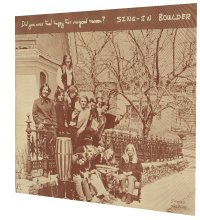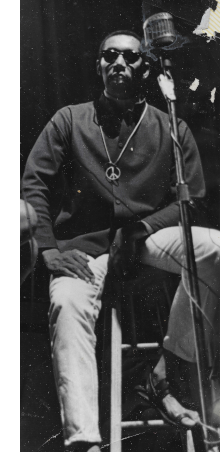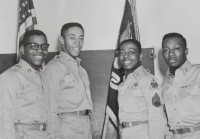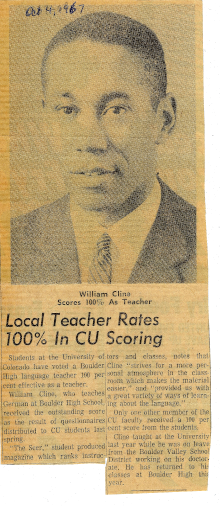
The Stories Behind the Music
Serendipity. Fate. Karma. Syzygy. In the dialect of the '60s, a "happening". The music of Sing-In was the product of a remarkable convergence of many, talented individuals.
Under Bill Cline's sponsorship of the Boulder High School Folk Song Club, the Sing-In Boulder folk-rock ensemble would tour and record on a four-year musical adventure from the late 1960s to the earyl 1970s.Bill had a special gift of charm and eloquence that attracted so many of us who were coming of age at a remarkable time.
It would be unfair to cast it as a stereotype, but the imprint left by James Clavell's landmark 1967 movie, To Sir With Love, was fresh on our minds and an integral and indelible inflection on our passage. You either wanted to hear Lulu, be able to sing the title song like Lulu, or even just be a student of Mark Thackeray (as portrayed by Sidney Poitier). In many ways, Bill was our Thackeray. Here was a man, also a remarkable teacher and mentor with a background seemingly from the outside (fewer than one percent of Boulder High students were African American), but beyond that, a gifted musician with experience in performing; experience in organizing performances.
… One Sing-In performance so inspired Oak Thorne, a biologist and educational film maker, that Dr. Thorne, himself an active participant in the Boulder music scene, employed his Owl Records label to produce a series of LP albums. The performance itself had been influenced by Oak, but in a circuitous way. In prior years, the Boulder High Folk Song Club's performances had been more characteristic of talent shows - announcers introducing artists who then performed their sets. The format of the show would change for the 1968-1969 school year. At the request of a mutual friend, Oak and his family had introduced themselves to Julie1 and her family when they arrived Boulder in the summer of 1964. She was not yet a teenager, but less than four years later she would be the BHS student who would be credited with "taking charge of producing" the Sing-In Boulder show. Oak and his family had traveled to New York and caught a Broadway performance of Wait a Minum, a collection of musical skits performed by an ensemble cast from South Africa. They returned with rave reviews, inspiring Julie and her family to do likewise.The rotating ensemble format inspired Julie to similarly organize the Sing-In show.
Bill Cline
In 1951, William P. Cline, known to us as Bill, or just “BC” (and later and more formally, Dr. Cline), armed with a four-year scholarship, made his way from his hometown of Mansfield, Ohio, 40 miles north to Oberlin College, one of the top five liberal arts colleges in the country. Having taken a leading role in accepting African Americans and women more than a hundred years earlier, Oberlin also had a world class Conservatory of Music, a School of Theology, and, oddly enough, John William Heisman would emerge at Oberlin as a legendary football coach, eventually resulting in his namesake trophy. Bill was the middle of nine children, and in that pre-electronic-craze era, grew up in a small house teeming with musical and social activity. His mother was a powerfully gifted church gospel pianist, and in that environment there was a lot of singing. With an extraordinary ear for music, Bill could hear something sung once, and flawlessly sing along the next time in harmony. In that era Ohio teenage weekends revolved around football and, for African-American teens, expert indoor rollerskating … from town to town, wherever the ‘action’ was. Never a dull moment …. Although he did not have an opportunity to study a foreign language until he was an 18-year-old
freshman enrolled in a college German class, that quick ear translated seamlessly into a gift for
languages. In spite of the late start, and having added French his sophomore year, he quickly
became bi-lingual in German and French, conversant in the language of any country he visited [he
refused to speak English in someone else’s country - said it was disrespectful].
Bill’s future wife, Eileen Tate, would remember coming to know Bill her freshman year at Oberlin,
when he was a dishwasher at her dorm. “People would hang out in the parlor until the dining hall
kitchen crew was done, and Bill would come out and regale the after-lunch crowd with his
imaginative ‘performances’ as he prepared for his next period audio lingual French class”. He was
hilarious … and with that daily ‘exercise,’ guess who learned the dialogues fastest? Star of
the class.
He was a quarter-miler on the track team, and practice was invariably followed by brisk
faster-than-the-eye pre-dinner games of ping-pong. Missing the weekend around-the-state
roller-skating, and not allowed to have cars on campus, Bill talked track coach Dan Kinsey
into opening one of the gyms for weekly roller-skating, purchasing the necessary pairs of skates.
Although he did not have an opportunity to study a foreign language until he was an 18-year-old
freshman enrolled in a college German class, that quick ear translated seamlessly into a gift for
languages. In spite of the late start, and having added French his sophomore year, he quickly
became bi-lingual in German and French, conversant in the language of any country he visited [he
refused to speak English in someone else’s country - said it was disrespectful].
Bill’s future wife, Eileen Tate, would remember coming to know Bill her freshman year at Oberlin,
when he was a dishwasher at her dorm. “People would hang out in the parlor until the dining hall
kitchen crew was done, and Bill would come out and regale the after-lunch crowd with his
imaginative ‘performances’ as he prepared for his next period audio lingual French class”. He was
hilarious … and with that daily ‘exercise,’ guess who learned the dialogues fastest? Star of
the class.
He was a quarter-miler on the track team, and practice was invariably followed by brisk
faster-than-the-eye pre-dinner games of ping-pong. Missing the weekend around-the-state
roller-skating, and not allowed to have cars on campus, Bill talked track coach Dan Kinsey
into opening one of the gyms for weekly roller-skating, purchasing the necessary pairs of skates.
 After graduating from Oberlin in 1955 with a degree in German, Bill joined the U.S. Army for a
two-year stint, in which he served as a medic, but was lucky enough to tour with the
Germany-based Seventh Army Soldier shows. As part of that he sang with a performing quartet,
The Singing Medics, which toured Germany and other European countries, including a command
performance for the King and Queen of Norway.
Out of the army, unable to find a job in his field, he took a battery of tests at the University of
Chicago that showed talent in a number of areas, and ended up as a hematology technician at the
LaRabida Heart Sanitarium. A great favorite of the children, who ‘did not want anyone except
‘Pied Piper’ Bill to draw their blood.’
After graduating from Oberlin in 1955 with a degree in German, Bill joined the U.S. Army for a
two-year stint, in which he served as a medic, but was lucky enough to tour with the
Germany-based Seventh Army Soldier shows. As part of that he sang with a performing quartet,
The Singing Medics, which toured Germany and other European countries, including a command
performance for the King and Queen of Norway.
Out of the army, unable to find a job in his field, he took a battery of tests at the University of
Chicago that showed talent in a number of areas, and ended up as a hematology technician at the
LaRabida Heart Sanitarium. A great favorite of the children, who ‘did not want anyone except
‘Pied Piper’ Bill to draw their blood.’
 Not surprisingly, he also discovered a passion for education. He married Eileen, a music teacher in a
Gary Indiana elementary school, in the winter of 1958, and that Spring a lucky correspondence
between an Oberlin College German professor and the Chair of the German Department at the
University of Colorado resulted in an offer of a five-week assistantship in the German Department
at the University of Colorado. On the strength of that, Bill and Eileen, who as a youngster on the
South Side of Chicago had always dreamed of the mountains, both quit their jobs and moved lockstock-
and-barrel to Boulder. Five weeks turned into ten, and then into the next year and beyond.
In 1967, he was recognized by German students at CU as being “100 percent effective as a teacher”.
Not surprisingly, he also discovered a passion for education. He married Eileen, a music teacher in a
Gary Indiana elementary school, in the winter of 1958, and that Spring a lucky correspondence
between an Oberlin College German professor and the Chair of the German Department at the
University of Colorado resulted in an offer of a five-week assistantship in the German Department
at the University of Colorado. On the strength of that, Bill and Eileen, who as a youngster on the
South Side of Chicago had always dreamed of the mountains, both quit their jobs and moved lockstock-
and-barrel to Boulder. Five weeks turned into ten, and then into the next year and beyond.
In 1967, he was recognized by German students at CU as being “100 percent effective as a teacher”.
Having completed his Master’s degree and still teaching at the University of Colorado, Bill was recruited by Boulder High School, which then offered only one year of German and hoped to develop a multi-level German program. Not long after Bill’s arrival there, the program had grown to a 5-year offering. He would continue with teaching stints at both Boulder High and CU for the rest of his too-short life.
Rather than employ the customary stick or carrot incentives, he laid the table for learning - a catalyst, not a propellant. He spoke German in a way that encouraged understanding. His speech resembled that of a newscaster on the nightly news on German TV. In other words, he spoke like someone who was being paid to speak and paid to be understood, albeit as naturally as a conversation over coffee. His flawless expertise (“not a trace of an American accent”) may explain why the German government would retain him to serve as its official translator at the 1972 Munich Olympics, and why he twice took leave to consult with Educational Testing Services at Princeton. His speech wasn’t so much formal as respectful and understanding of the psyche and experiences. Whether he was speaking German, French or English, his gentle, thoughtful, enthused speech made you want to listen. He was always polite and charming, and perhaps a greater listener than he was a speaker. During the 1968-1969 school year Bill sponsored Boulder High’s Folk Song Club, from which the performing group Sing-In Boulder emerged. The following year he took a leave of absence to serve as Counselor and Assistant Dean of Admissions at Swarthmore College in Pennsylvania for the 1969- 1970 school year. At Swarthmore, he also was re-united with his Mansfield High School buddy Frederic Pryor, who while doing research for his dissertation on Economics of East Germany, had been arrested as a spy and imprisoned in East Germany - until released by the Russians along with Gary Powers in the U-2 exchange [See the film ‘Bridge of Spies]. Pryor, retired Swarthmore Economics professor, remains a family friend. Whether touring with The Singing Medics in 1955, convening The Young Prophecies in Kansas in the summer of 1968 while serving as a German instructor and assistant camp supervisor, organizing and performing in Sing-In Boulder in 1969, or assembling a performing group at Swarthmore in 1970, Bill was always able to find a way to integrate his passion for music with the duties of his work. After returning to Boulder High from the Swarthmore leave, Bill continued to sponsor Sing-In Boulder, and the core of the group began to be known as “Propinquity,” a popular Sunday night Hungry Farmer fixture. He passed away at the end of the summer of 1978 at the age of 45, shortly after arriving in Princeton, N.J, his second such leave from Boulder High to work as Visiting Scholar with Educational Testing Services, the organization that conducts the PSAT and SAT tests, along with related educational research and assessments worldwide. Never to be forgotten. [Eileen T. Cline is former Dean of the Peabody Conservatory of Music of The Johns Hopkins University. Dr. Cline collaborated on the production of this biographical segment, and contributed the photographs and printed materials.]1 The last names of student performers are omitted from searchable text.
